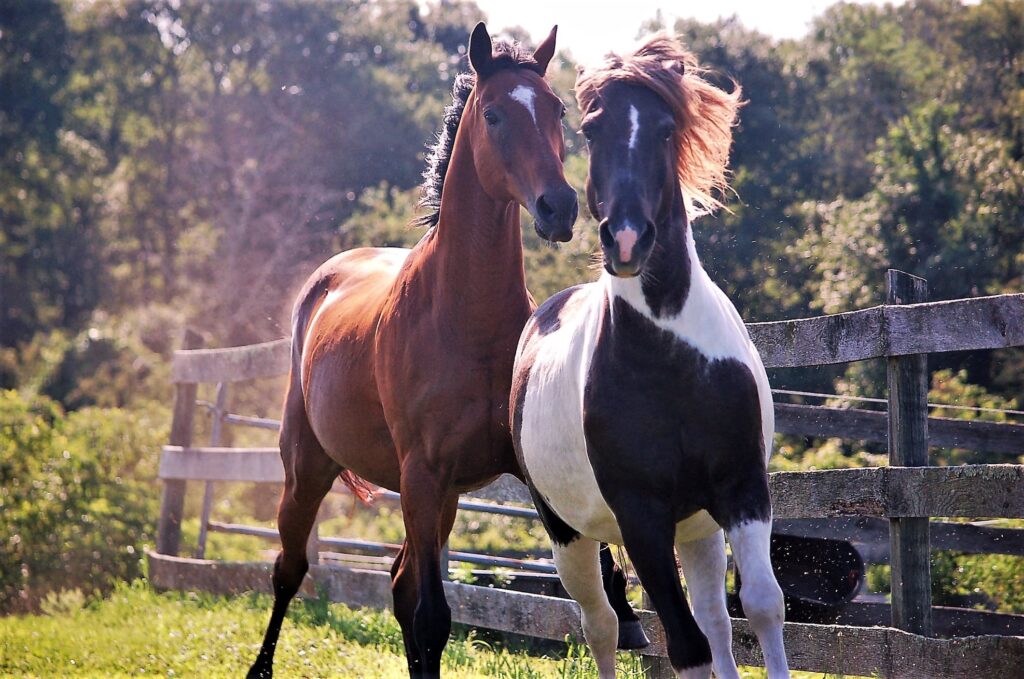By RENEE DiNINO
Connecticut has a beautiful landscape for open fields and farms, including horse farms, rescues and sanctuaries. As of 2017, there were 1,300 working horse farms in Connecticut, according to the U.S. Department of Agriculture. Many of these farms offer a variety of services for both the people they serve and the horses themselves, including respite care and rehabilitation services for those with spectrum disorders, disabilities or PTSD.
Owning a horse is a huge responsibility both physically and financially. Thankfully there are many organizations in Connecticut that can help.
One such organization is the Connecticut Draft Horse Rescue Inc. (CDHR), a 501(c)(3), nonprofit dedicated to saving the lives of draft horses that were bound for slaughter; victims of starvation, neglect or abuse; or whose owners are unable to provide for their needs. “It’s located in East Hampton on 20 acres of beautiful land owned by the same family since it was deeded to the family by the King of England in 1632. The family then wanted to keep the land agricultural and not developed. In 2017, CDHR was approved happily by the family that is thrilled to know the land will have special meaning,” stated Sarah Grote, vice president of CDHR’s board of directors. This will ensure a lasting legacy with meaning for generations.
“In addition to our work with the horses, we educate people about the proper care, training and responsible ownership of horses,” added Grote. “We organize gelding clinics to address the problem of unwanted horses, and we promote and support equine efforts and animal rescue in times of natural disasters.”
Currently, they are in need of volunteers, donations, and even adopters or foster homes for their horses. In May 2024, CDHR rescued six horses from auction; while the money raised helped get them, the medical care, hay, grain, supplements and supplies will continue to require financial support. “We currently have 18 horses at our farm,” said Grote. “To date, CDHR has rescued 47 horses since 2011 with the majority being placed; some have crossed the rainbow bridge with the compassion and care of CDHR.”
People are encouraged to help via financial donations, matching gifts through businesses, sponsoring a horse and planned giving. Horse can live a long life, some even to 30 plus years. It can cost the farm on average $160 a day to feed and care for the horses with the 18 they currently have. “This fluctuates with the number of horses, hay prices, and medical and other miscellaneous needs,” said Grote.
Volunteering is another great way to help and even get the family involved with farm chores, hay deliveries, property maintenance and light office administrative duties. To find out more or attend fundraising events, check ctdraftrescue.org. For late-breaking updates and needs, follow them on Facebook @ctdrafthorserescue.
Mitchell Farm Equine Retirement, Inc. is another 501(c)(3) nonprofit group making a difference on 50 acres in Salem. The farm, as of May 2024, has rescued 119 horses and donkeys over their 20 years in existence at their permanent sanctuary.
“It really is a huge effort, but everyone can help, whether they volunteer in the care of our horses, make a donation or attend one of our great fundraising events. It all makes a difference. Imagine listening to your favorite music surrounded by peaceful grazing horses. It doesn’t get any better!” said Dee Doolittle, the group’s founder and executive director.
They currently have 30 horses and four donkeys that are loved and cared for by 47 volunteers and a staff of four. “Our goal every year is to raise $350,000 to provide the hay, feed, bedding, health care and medications that they deserve,” continued Doolittle. “Every horse at Mitchell Farm has a story. Some are amazing and unique, some sad, some challenging. All have a happy ending spending their remaining years just being horses.” To help continue the mission of the farm, visit mitchellfarm.org.
Horses have a unique capacity for being gentle giants with incredible sensitivity to those with special needs. “Hospital for Special Care’s Manes & Motions Therapeutic Riding Center has been rebuilding lives for 25 years through the power of the horse and human connection. Your support of Manes & Motions sustains a legacy that allows participants to achieve remarkable outcomes that reach well beyond the barn,” said Annamarie Grise, Hospital for Special Care’s development and communications manager.
Manes & Motions is located on Daniels Farm in Middletown. Founded by Gerri Massi with the main purpose of helping individuals impacted by autism, Down syndrome, cerebral palsy, stroke or traumatic brain injury, multiple sclerosis, and more. She learned of the therapeutic power of horses when she volunteered some of her own horses for participants of Special Olympics Connecticut in the early 1990s. “The generosity from private and public donors ensures the mission will continue,” said Grise. To learn more about their programs, fundraisers and ways to help, visit hfsc.org/sports-and-fitness/manes-and-motions.
As for training or pleasure, Connecticut boasts many farms that would enjoy your company. You’re never too old to take a lesson, compete or show off your skills at local events throughout New England. A simple search for “Connecticut horse riding” brings up a long list of stables across the entire state. Just remember to wear riding boots and an equestrian helmet…and listen to the horse. Horses connect on a special level of intuition. They feel empathy; they understand stress and our emotions. Connecticut is filled with incredibly peaceful places to experience the wonder of these gentle giants. Giddy up!
Renee DiNino is a radio and TV host, blogger, podcaster, public speaker and animal advocate. Connect on Facebook @reneedininoct, Instagram @reneedinino and Twitter @myctcommunity.






More Stories
Winter Wellness: Simple Ways to Feel Your Best All Season
A Hallmark Movie Featuring Slightly Old Folks
Hartford and Raleigh: A Tale of Two Hockey Hubs